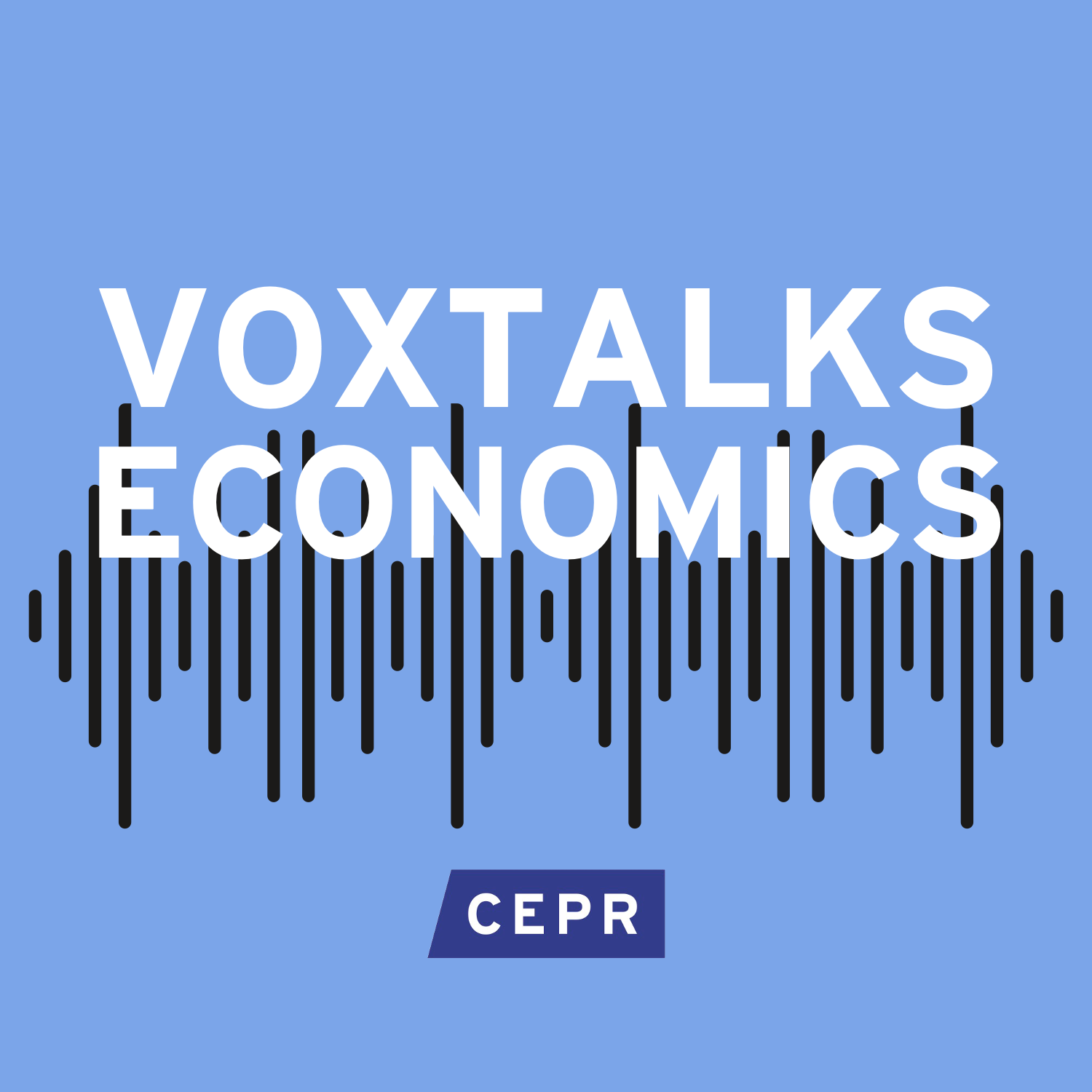

VoxTalks Economics
VoxTalks
Learn about groundbreaking new research, commentary and policy ideas from the world's leading economists. Presented by Tim Phillips.
Episodes
Mentioned books

Jan 16, 2026 • 20min
S9 Ep4: Do stablecoins threaten financial stability?
Richard Portes, an esteemed economist and founder of the CEPR, dives into the world of multi-issuer stablecoins and their potential risks. He explains how these digital tokens, appealing for their ease of transfer, could threaten financial stability if not properly regulated. Portes reveals the complexities of cross-jurisdiction redemption risks and the implications for European reserves. He discusses the intense lobbying from stablecoin issuers and outlines policy options for regulators, warning that without tighter rules, financial contagion could ensue.

4 snips
Jan 14, 2026 • 25min
S9 Ep3: Can Europe defend itself?
Moritz Schularick, a prominent economist at the Kiel Institute and CEPR, dives into the pressing question of European defense. He discusses the urgency for Europe to rearm and whether it can turn its industrial capacity into effective military deterrence. Schularick emphasizes the need for a unified defense architecture and calls for investment in next-gen technologies like AI and robotics that can benefit the economy. He also highlights the importance of joint procurement and warns against relying on uncertain US support for security.

Jan 9, 2026 • 25min
S9 Ep2: Has AI eaten the economics major?
In this engaging discussion, Dame Wendy Carlin, a Professor of Economics at UCL and co-founder of the CORE Project, explores the future of economics education amid the rise of AI. She highlights how CORE transforms traditional teaching by focusing on real-world applications and critical thinking. Wendy emphasizes the need to develop skills in ambiguity and independent judgment, which AI cannot replace. She also addresses employer concerns about graduates' soft skills and shares innovative ideas for integrating AI as a cognitive partner in learning.

Jan 7, 2026 • 24min
S9 Ep1: Trump, trade, and AI growth
Another special episode recorded at the CEPR annual symposium in Paris. The Trump administration says it wants America to lead in AI, but what does that mean in practice for trade and productivity? Will AI make growth great again, or just inflate a short-term capital spending boom?Gary Gensler of MIT and CEPR (also a former chair of the Securities and Exchange Commission) unpacks the administration’s AI action plan, helps us work out what's happening to export controls, and untangles the deal-making geopolitics of AI hardware.

Dec 19, 2025 • 26min
S8 Ep65: The future of globalisation
At the CEPR annual Symposium in Paris we sat down with Adam Posen, president of the Peterson Institute for International Economics, a distinguished fellow of CEPR, and a global authority on geopolitics and trade to discuss the profound changes in the multilateral order in 2025, how countries will adjust to this new normal – and whether the changes we have seen will ever be unwound.

Dec 12, 2025 • 43min
S8 Ep64: A London economic consensus?
Tim Besley, a renowned economist from the London School of Economics, and Andrés Velasco, a former policymaker, dive deep into the challenges facing today's economic landscape. They discuss their ambitious work, The London Consensus, which aims to provide adaptable policy principles rather than one-size-fits-all solutions. The duo highlights the need for well-being beyond GDP, the importance of growth, and the crucial role of state capacity in effective governance. They also caution against simplistic economic paradigms while emphasizing coherent narratives for better policymaking.

Dec 5, 2025 • 19min
S8 Ep63: Do sanctions work?
Economic sanctions are the big geoeconomic bazooka. But what does history tell us about how well they work, and their relevance today. And does the theory match the data?Moritz Schularick of the Kiel Institute for the World Economy and CEPR talks to Tim Phillips about the evidence of the history of sanctions on what they can achieve, whether we expect too much too soon from small sanctions – and whether politicians are prepared to impose the sanctions that bite.

7 snips
Nov 28, 2025 • 18min
S8 Ep62: The cost of lost biodiversity
Biodiversity is essential for the wide range of economic activities that our planet needs. Yet, the economic consequences of its global decline are hard to estimate, because most population studies focus on individual species in isolation.Frederik Noack of the University of British Columbia argues that this misses a central insight about biodiversity: a healthy environment depends not just on individual species, but also on the way they work together to keep our natural environment in balance. One especially important aspect of this is the way that birds help keep crops safe from pests and reduce the need for pesticides.He tells Tim Phillips about the long-term decline of bird populations in the US and the knock-on effect on agriculture, and pollution.

Nov 21, 2025 • 22min
S8 Ep61: The politics of sustainability reporting
Lucrezia Reichlin, an esteemed economist and expert in corporate reporting, discusses pivotal issues surrounding sustainability reporting and the ISSB initiatives. She delves into the need for standardized corporate disclosure and the challenges posed by differing regulations in the US and Europe. Reichlin also highlights the debate between investor-focused and double materiality approaches, and how emerging markets are embracing sustainability standards. Plus, she examines the impact of these regulations on corporate behavior and the importance of consistent measurement in addressing climate change.

Nov 19, 2025 • 34min
S8 Ep60: The planet has a problem with populism
Join economist Sergei Guriev, an expert on the political economy of populism, and political scientist Catherine de Vries, who studies the drivers of populist support. They dive into the rising tide of populism and its implications on climate policy. Explore how economic crises fuel populist narratives and the challenges they pose for democracy and sustainability. They discuss the critical need for clearer communication and inclusive policies to balance climate action with public support, revealing a complex relationship between populism and environmental priorities.


